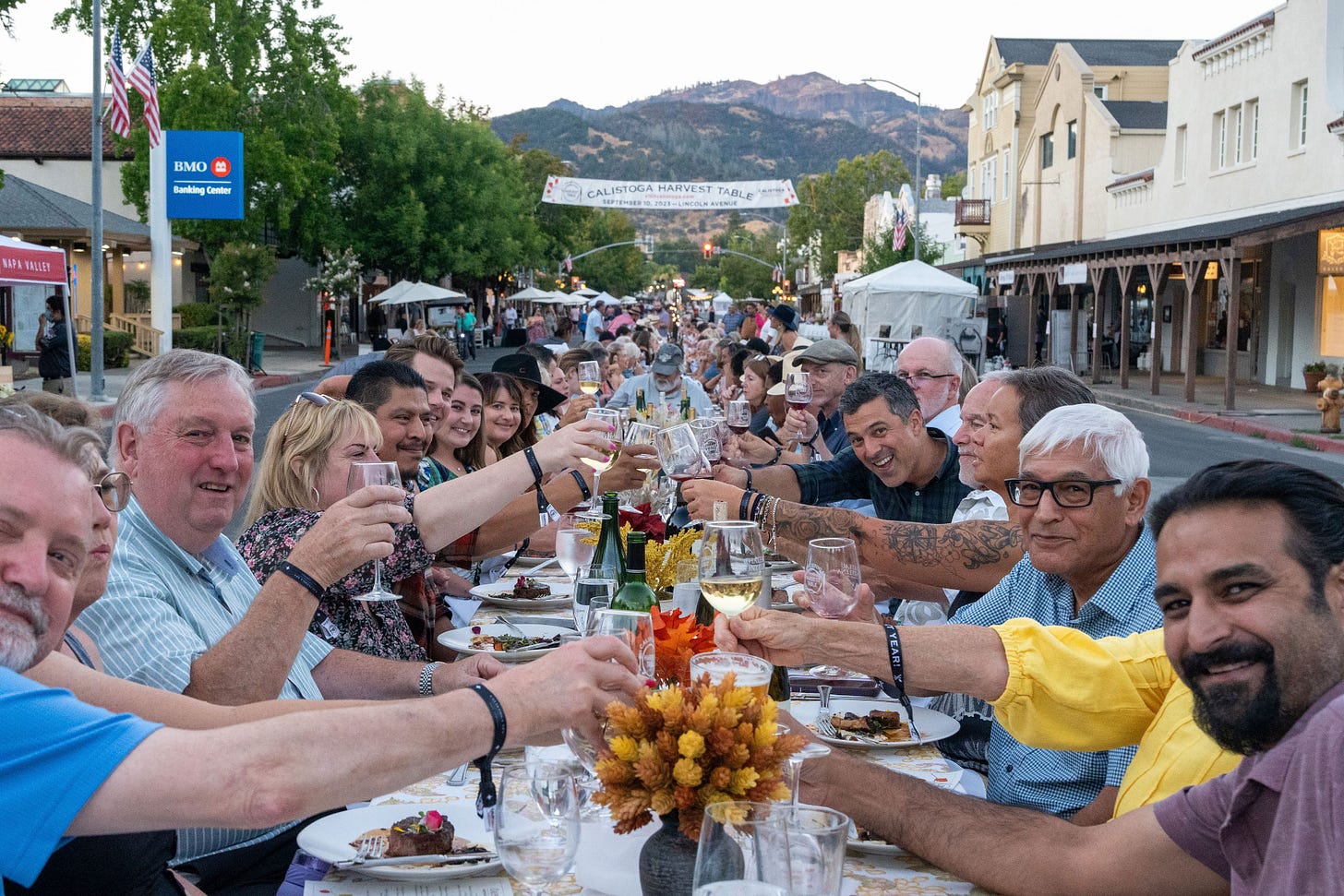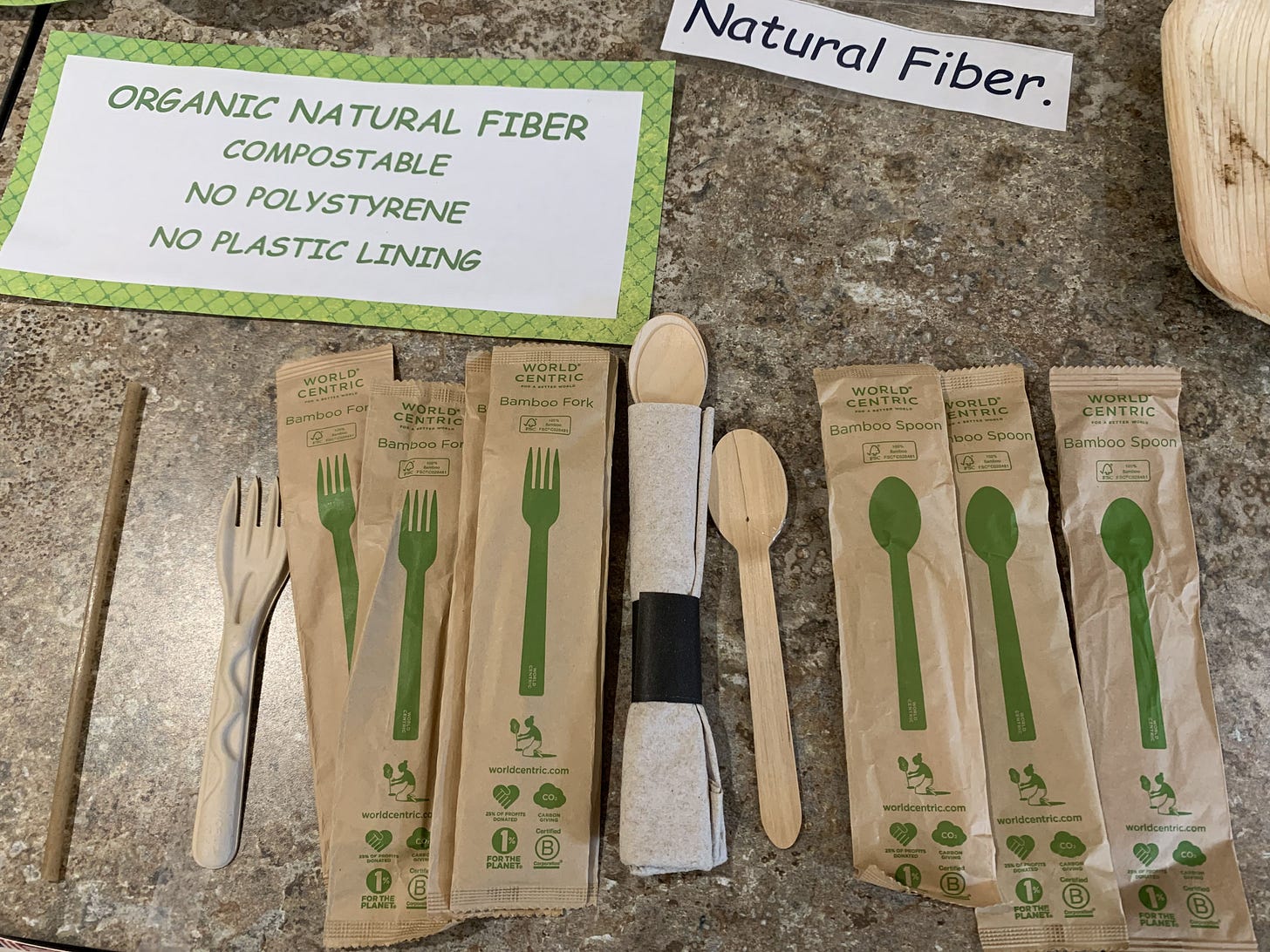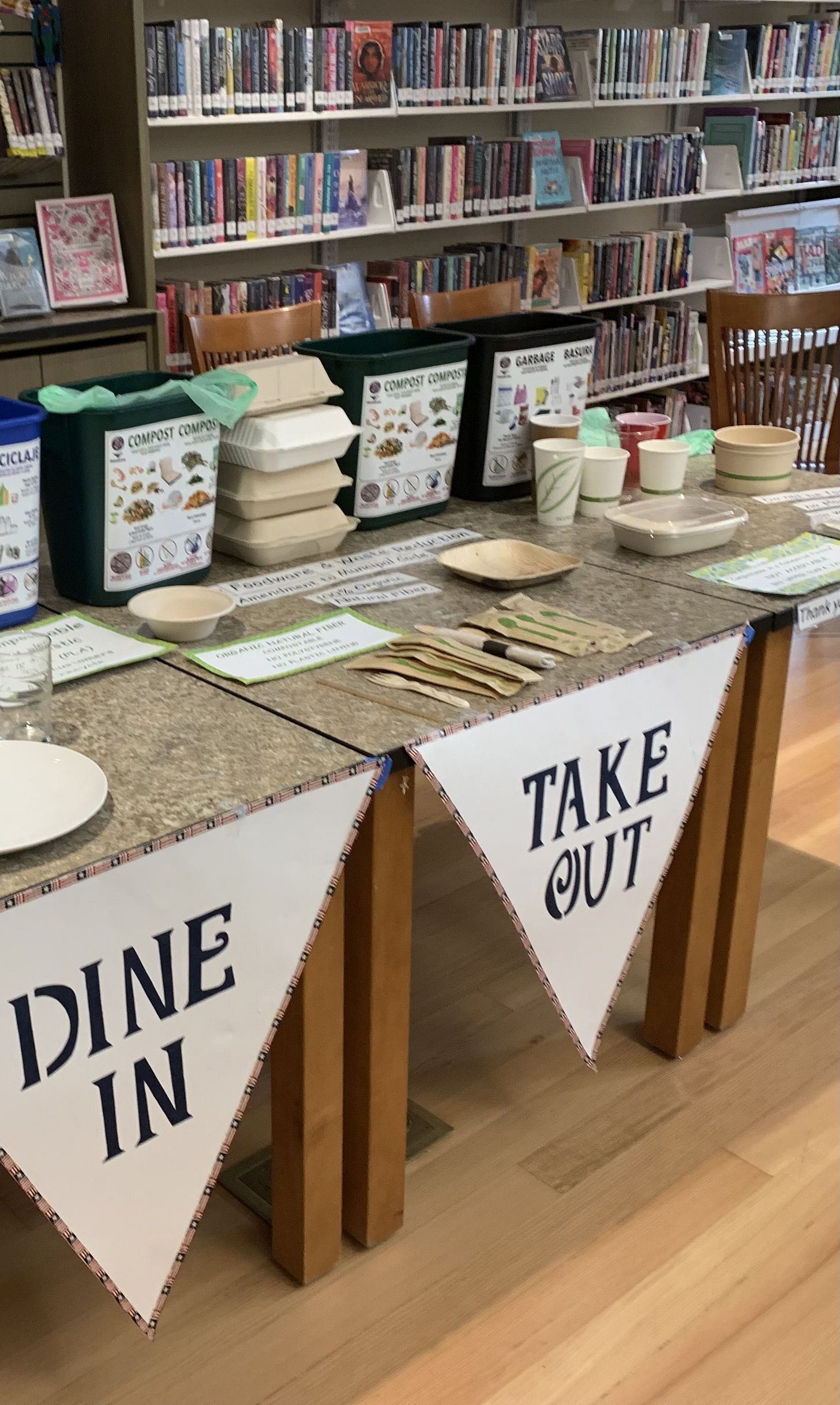CALISTOGA, Calif. — By mid-March a new ordinance will ban the sale and use of all polystyrene, including plastic utensils, foam food containers and coffee cups, often mistakenly called Styrofoam, anywhere within the city limits.

According to the city’s Green Committee, banning polystyrene plastics is expected to have multiple benefits, including reducing litter. Calistoga joins dozens of other communities, including Berkeley, San Francisco, Oakland and Sebastopol, that have banned polystyrene.
The Calistoga Reusable Foodware and Waste Reduction ordinance also bans single-use and disposable foodware (utensils, cups, plates, etc.) for those dining in restaurants or on their outdoor patios. It sets utensil and container standards for in-house restaurant dining and for takeout foods. All are mandated to be reusable, recyclable or compostable.
For in-house dining, restaurants should use reusable foodware, meaning these service items can be washed, sanitized and used again.

Foodware for takeout and leftovers must be made of natural fiber, compostable materials, including disposable products made from bamboo, birchwood, sugarcane, wheat or wood. The only exceptions to the polystyrene foam ban are takeout cups for hot liquids, such as coffee and soup, because no alternatives are available. Those cups must be rated recyclable with No. 1 or No. 2 symbols.
“The whole point is not to put anything into the garbage,” said Millie Pease, a member of the city’s Green Committee who has spent the last 30 months working with Antoinette Mailliard, the committee’s chair, and volunteer MaryEllen Hester on the ordinance. Helping them with research were Gayle Dierkhising, owner with her husband, Alex, of Hydro Bar & Grill; the former owner of Calistoga’s Café San Marco; and Christy Pestoni, director of Government Affairs, Waste Connections, the company that recently acquired Upper Valley Disposal & Recycling Services and the Clover Flat Resource and Recovery Park.

On Monday, Feb. 12, Pease set up a display of items that explained the new foodware changes at the Calistoga Library. It was the same display that had spent three months in the store window at the Calistoga Chamber of Commerce. During the hour or so after the display was set up, two people stopped by to talk to Pease, Hester and Mailliard while they were being interviewed for this story. Clearly people are interested in the recycling efforts undertaken by Calistoga and its Green Committee.
The new law covers all merchants selling food and/or drink to their customers, including restaurants, grocery stores, delis, coffee shops, ice cream vendors, bakeries, food trucks, wine-tasting rooms, hotels, motels, and bed and breakfasts. Besides spelling out utensils that are allowed, other provisions in the law include a 25-cent charge for carryout paper bags. All bags, both bought at the grocery’s checkout stand and small produce bags, must be made of compostable paper or be green “bio-bags” in most instances.

According to the ordinance, its purpose is “to reduce the significant impact of plastic and other food packaging pollution on climate change, wildlife, litter, the economy and health of our community.” Although the Calistoga City Council approved the ordinance on March 31, 2023, they wanted local businesses to have an entire year to prepare before it became law. It goes into effect on March 20. Calistoga code-enforcement officers are responsible for enforcing the ordinance, which is complaint-driven. After a warning, violations of the ordinance will result in administrative fines starting at $100.
The ordinance also mandates that three waste containers — gray or black for garbage, blue for recyclables and green for compostables/organics with appropriate signage – be placed next to each other inside of each of the businesses. Not all the restaurants have the bins, Pease said, but “We’re hoping they will. Cal Mart has them.”
Pease, Mailliard and Hester all mentioned that Calistoga’s grocery store, Cal Mart, and its owner, Bill Shaw, have been very supportive of the changes required by the new ordinance. Other Calistoga businesses are also stars, including Hydro Bar & Grill, Pacifico, Local Q 707, House of Better and Mangia Mi restaurant.

Additionally, Pease said the city has ordered nine commercial waste-management trash bins for Pioneer Park and Logvy Park at a cost of $24,000. The Hazleton Post Bins are made by a company called Envyrozone based in Toronto, Ontario, Canada.
Mailliard said the city has promoted the new ordinance and its changes to the restaurant and food-vendor community, helping them to understand it and what to expect come March 20. In fact, the Green Committee has sent out numerous emails about the changes and hosted two workshops, one in June and another in August. They included the 35 restaurants in Calistoga as well as the B&Bs and the winery tasting rooms that serve food, such as Picayune Cellars.
“I’m hoping that your article will help spread it further with the general public,” Mailliard said. She added the restaurant and food vendors are “doing their best, but it’s hard to understand because the labels on some supplies are not necessarily accurate. But given the fact that mistakes are going to be made because of the misinformation, I think most people really want to do the right thing. That’s my take.”
The confusion and misinformation are because some of the restaurant supplies labeled “compostable” are made with plant-based plastics that are not compostable at any of the Napa compost facilities. These supplies are not permitted. Nor are coated-paper food containers because they are coated with plastic or wax.
The committee members also reached out to the dozen or so restaurant suppliers, and all but one has been responsive to the new rules.
The new law is going to be expensive for businesses. A quick internet search revealed that plastic spoons, for example, cost 3.8 cents apiece (1,000 for $38), while bamboo spoons are 9.5 cents apiece (1,000 for $95). Common compostable items include 100% untreated wood, bamboo or birchwood, paper or cardboard, wheat, sugarcane or agave.
Some people mistakenly think of polystyrene as Styrofoam, but it is not. Styrofoam is a trademarked brand of closed-cell extruded polystyrene foam that is light blue and used for insulation in buildings. Styrofoam is manufactured and owned by DuPont. Polystyrene foam is a chemical plastic that is used in a wide variety of packaging. It is not biodegradable and degrades slowly in the ocean as microplastic marine debris. Many animals mistake it for food and are harmed by its toxicity.

The city of Berkeley first banned polystyrene fast-food containers in 1987, the first city in the nation to do so, and banned all polystyrene foam food containers a year later. By 2006, 100 localities, including San Francisco and Oakland, had banned polystyrene foam use in restaurants. In 2019, the state of Maryland banned polystyrene foam food containers and cups, and the following year New Jersey followed suit.
Besides Pease and Mailliard, the city’s Green Committee includes John Gleazer, vice chair, Jeremy Grove and Sean Birge.
If today's story captured your interest, explore these related articles:
Black Sears family donates land to help create wildlife corridor
Calistoga's Old Faithful Geyser: from tourist trap to natural wonder
Dave Stoneberg is an editor and journalist who has worked for newspapers in both Lake and Napa counties.





I applaud the City of Calistoga for doing this!! Every city in the country should do this. It's long overdue. People will get used to the price points. It's money well-spent to help save our planet.